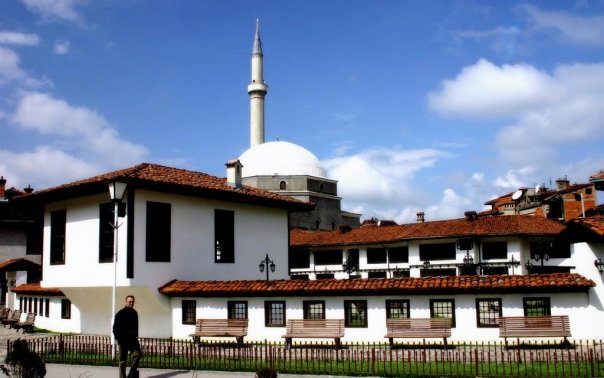Sunday, July 14th 2013

The League for the Defense of the Rights of the Albanian Nation (Lidhja per mbrojtjen e të drejtave te kombit Shqiptarë) commonly known as the League of Prizren (Albanian: Beslidhja e Prizrenit) was an Albanian political organization founded on 10 June 1878 in the old town of Prizren, in the Kosovo Vilayet Mainland Gegeria (Upper Albania) (vilayet) of the Ottoman Empire.
The treaties of San Stefano and Treaty of Berlin both assigned areas that were also inhabited by Albanians to other states. The inability of the Porte to protect the interests of Albania’s political and territorial integrity forced the Albanian intellectuals, beys and pashas not only to organize their own defensive and political organization, but also to create an autonomous administration for Albania, (first step towards self determination) like those Serbia, Bulgaria and the other Danubian Principalities had enjoyed before their independence, throghout the 19th century.
The League of Prizren made a program of reforms based on five essential grounds in the General Assembly of the League that approved the Constitution (Ana-Yasa) of the Albanian League, on July 1, 1878. The Constitution consisted of 5 points.
The unification of Albanian vilayets into one vilayet, with its capital city Ohrid.
Creation of the autonomous administration for the vilayet of Albania
Formation of the Albanian armed forces (Police and Army)
Creation of the general assembly as a regular body with legislative power.
The appointment of a head-state Governor in head of Albanian vilayet.
Once the constitution was announced, all the branches of the League of Prizren from across Albania were to adopt the program in the upcoming Dibra Assembly on October 1, 1878 and loading a delegation composed of 12 well-known Albanian personalities of the time to officially present the program to the Ottoman Sublime Porte.
The 1877-1878 Russo-Turkish War dealt a decisive blow to Ottoman power in the Balkan Peninsula, leaving the empire with only a precarious hold on Albania and eastern Balkans. The Albanians’ fear that the lands they inhabited would be partitioned among Montenegro, Serbia, Bulgaria, and Greece fueled the rise of resistance. The first postwar treaty, the abortive Treaty of San Stefano signed on 3 March 1878, assigned areas claimed by the League of Prizren to Serbia, Montenegro, and Bulgaria. Austria-Hungary and the United Kingdom blocked the arrangement because it awarded Russia a predominant position in the Balkans and thereby upset the European balance of power. A peace conference to settle the dispute was held later in the year in Berlin.
Abdyl bey Frasheri, The League movement’s leading figure.
The Treaty of San Stefano triggered profound anxiety among the Albanians and Bosnians meanwhile, and it spurred their leaders to organize a defense of the lands they inhabited. In the spring of 1877, influential Albanians in Constantinople—including Abdyl Frashëri, the Albanian national movement’s leading figure during its early years—organized a committee to direct the Albanians’ resistance. In May the group called for a general meeting of representatives from all the areas that existed Albanian communities that time. The Committee’s members were Ali Ibra, Zija Prishtina, Sami Frashëri, Jani Vreto, Pashko Vasa, Baca Kurti Gjokaj and Abdyl Frashëri.
During the meeting in Prizren a kararname was signed by 47 beys in June 18, 1878. The document represents an initial position, mainly supported by landlords and individuals related to the Ottoman administration. In Article 1 of this document, these Albanian leaders rSultaestated their intention to preserve and maintain the territorial integrity of the Ottoman Empire in the Balkans by supporting the porte, Islamic Shariah law, and “to struggle in arms to defend the wholeness of the territories of Albania”. Article 6 of the same document restates the hostility of Albanians, as Ottoman loyalists, to the independence of both Bulgaria and Serbia. “We should not allow foreign armies to tread on our land. We should not recognize Bulgaria’s name. If Serbia does not leave peacefully the illegally occupied countries, we should send bashibazouks (akindjias) and strive until the end to liberate these regions, including Montenegro.”
The Berlin Congress
The Congress of Berlin ignored the league’s memorandum, and Germany’s Otto von Bismarck even proclaimed that an Albanian nation did not exist—later he declared he had made a mistake proclaiming Albania was ‘just a geographic notion’. The congress ceded to Montenegro the cities of Bar and Podgorica and areas around the mountain villages of Gusinje and Plav, which Albanian leaders considered Albanian territory. Serbia also gained some territory which included also ethnic Albanians. The latter, the vast majority of them loyal to the empire, vehemently opposed the territorial losses. Albanians also feared the possible loss of Epirus to Greece. The League of Prizren organized armed resistance efforts in Gusinje, Plav, İşkodra, Prizren, Preveza, and Yanina. A border tribesman at the time described the frontier as “floating on blood.”




